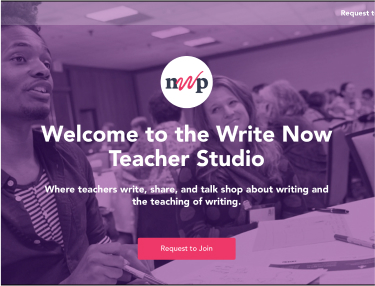Discover Content
Results for “Designing for Connected Learning and Teaching”
The Power of Authenticity: Motivating Students with Meaningful Audiences
Three educators present the projects that provided their students with authentic audiences motivating the students’ best efforts. These authentic writing opportunities include developing broadcast Media, collaborative “maker” projects, blogging, Ted-style Talks, and submissions to Film…
Today’s Reasons Why We Need Students to Write for Authentic Audiences
Why students’ voices, interests, stories, and experiences should reach real readers and some ways to support this.
Let 'Em Shine ~ Elevating PBL
A year-long project-based learning project called Let It Shine which connected students across three high schools to ask questions surrounding local monuments and their stories.
Lessons in Linked Learning and Maker Education from the Wonder Workshop
Teachers at Grass Valley Elementary engage young people in exploring their interests and found that Project Based Learning with a focus on Maker Education increased student engagement and empowerment. Included are examples of student work, links to Maker kits, prompts, and templates.
Exploring Our Environment Together: Green Is the New Pink
A school-community-university partnership, called the “Green Is The New Pink: Young Women Environmentalism-in-Action,” supported young women in grades 8-11 to explore environmental issues in a local context, igniting passions through their own inquiries.
Disrupting the Prolonged Silence: Youth Inquiry of the Tulsa Race Massacre
Using digital tools and the power of student-inquiry, 6-12 graders explored the question, “What can we learn about the Tulsa Race Massacre to make the world a better place?” Here are field trip documents from when The Oklahoma State University Writing Project partnered with the John Hope…
Reflections on Partnering with a Juvenile Detention Center: The Uncaged Project
The Teen Center at the Nashville Public Library partnered with educators from a juvenile detention center that houses incarcerated male youth to explore connected learning through music and video projects based on the students’ definitions of freedom. Raemona Little Taylor explains how the…
Seize Your Future: Career Passion Projects
Educators in the Lake Stevens School District in Washington give students the chance to earn failed credits over a three week program by pairing project-based learning with students’ own career ambitions. Included are samples of student work and PBL student surveys.
Addressing Gun Violence: Creating Visionaries, Storytellers and Community Activists
When students requested to learn more about the topic of gun violence, teachers drew on the Expeditionary Learning Education Model with interdisciplinary lessons in the humanities, math, and the arts, to co-design a three-month curriculum entitled “Addressing Gun Violence: Creating…
This is Not School: Designing a Storytelling Project for a Community
Connecting students from sixteen Kansas City High School districts, KC Storytellers was created to break down divisive barriers across communities while expanding the audience and purpose for personal writing in the classroom. Included are program development tips to maintain the “this is…
Advocacy for Game Design: Classes that Keep Student Interest
Playable Fashion at the Academy of Innovative Technology in NYC provides tools to teach students game design, technology, and fashion to engage students in active, creative and critical practices that integrate technology with real life. Included are resource links, program development tips,…
Write Now Teacher Studio

Where teachers write, share, and talk shop about writing and the teaching of writing
Hosted by the National Writing Project, the Write Now Teacher Studio is an open, online community of educators for educators. It’s a place to write together, examine our teaching, create and refine curricula, and work toward ever more effective and equitable practices to create confident, creative, and critical thinkers and writers in our classrooms and courses.

